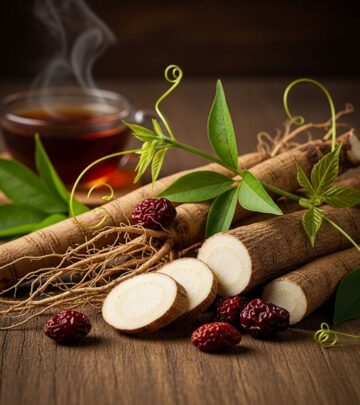10 Proven Health Benefits of Buckwheat Tea (Soba Cha)
Toasty infusion offering caffeine-free support for glucose control and vascular health.

If you are on a gluten-free journey or simply looking for a nutritious, caffeine-free beverage, buckwheat tea—also known as soba cha—offers multiple science-backed health benefits. Made from roasted buckwheat seeds or grains, this soothing drink features a delicate, toasty flavor and serves as a refreshing alternative to traditional caffeinated teas. Below we explore everything you need to know about buckwheat tea, including its nutritional value, brewing tips, scientific health benefits, and frequently asked questions.
What Is Buckwheat Tea?
Buckwheat tea is a caffeine-free, golden-yellow herbal infusion made by brewing or steeping roasted buckwheat grains or seeds. Although called “buckwheat,” the plant is technically a pseudocereal: it shares many characteristics with true cereals (like wheat and rice) but is botanically unrelated and naturally gluten-free. Buckwheat is commonly used in soba noodles, pancakes, bread, and, notably, as the base for this flavorful tea.
- Flavor Profile: Mildly sweet, toasty, nutty, with notes similar to brown rice or roasted barley tea.
- Caffeine-Free: Suitable for those who are sensitive to caffeine or looking for an evening beverage.
- Widely Enjoyed: Popular in Japan (as soba cha), Korea (as memil-cha), and increasingly recognized worldwide.
Buckwheat: An Overview
Buckwheat (Fagopyrum esculentum) is a nutrient-dense seed originally from Asia. Despite its name, it is not related to wheat and contains no gluten. The seeds are versatile, used for flour, groats, or roasted as a base for tea. Buckwheat stands out for its high nutritional value and the presence of unique antioxidants, contributing to several health benefits.
- Rich in protein, fiber, vitamins, and minerals
- Contains rutin, quercetin, and other powerful plant compounds
- Used both as a staple food and for therapeutic infusions
Nutritional Value of Buckwheat Tea
Buckwheat tea is calorie-free and fat-free when brewed (as typical steeped herbal teas are). However, it contains a range of beneficial micronutrients and bioactive compounds leached from the roasted seeds/grains into your cup:
- Rutin: A polyphenol antioxidant that supports vascular health and reduces inflammation.
- Quercetin: Another potent antioxidant present in buckwheat.
- Magnesium and Potassium: Essential minerals for heart and muscle function.
- B Vitamins: Thiamine, riboflavin, niacin, folate (trace amounts), supporting energy metabolism.
- Amino Acids: Buckwheat contains high-quality protein.
In addition, buckwheat is a natural source of dietary fiber when its groats are consumed whole. While the fiber is mostly retained in the whole grain and not the tea, the antioxidants and polyphenols are efficiently infused during steeping.
The Top 10 Science-Backed Buckwheat Tea Benefits
Modern research highlights numerous health advantages of consuming buckwheat tea regularly. Here are the top proven perks:
1. Supports Healthy Blood Sugar Levels
The compounds in buckwheat, including D-chiro-inositol and soluble fiber, may help stabilize blood sugar spikes by improving insulin function and slowing glucose absorption. This makes buckwheat tea a potential ally for those with type 2 diabetes or metabolic syndrome. Studies show it can contribute to better glycemic control and lower the risk of insulin resistance.
2. Promotes Heart Health
Rutin and other antioxidants in buckwheat tea protect blood vessels, reduce inflammation, improve lipid profiles, and lower blood pressure. Regular consumption may help decrease LDL (bad) cholesterol while increasing HDL (good) cholesterol. This effect lowers the risk of atherosclerosis and heart disease.
3. Aids in Weight Management
Buckwheat tea is a calorie-free beverage that can boost satiety thanks to its subtle nutty flavor and presence of plant compounds. Although the effect is modest compared to solid buckwheat foods, regularly replacing sugary or high-calorie drinks with buckwheat tea can support weight loss and maintenance efforts.
4. Gluten-Free and Gut Friendly
As buckwheat contains no gluten, the tea is naturally gluten-free—making it suitable for those with celiac disease, gluten sensitivity, or anyone seeking to reduce gluten from their diet. Its gentle effect on digestion makes it a soothing choice for the gut, often enjoyed by people looking for anti-inflammatory drinks.
5. Strengthens the Immune System
Buckwheat tea contains essential vitamins and minerals (including zinc, selenium, and B vitamins), nourishing the immune system. The tea’s antioxidants also help combat harmful free radicals and reduce oxidative stress, pivotal for maintaining healthy immune defenses.
6. Supports Female Reproductive Health
Research indicates that rutin and related flavonoids in buckwheat may positively influence ovarian function and help manage polycystic ovary syndrome (PCOS). D-chiro-inositol, present in buckwheat, may improve the metabolic and hormonal profile in women with PCOS and support fertility.
7. Reduces Edema and Supports Healthy Veins
Rutin in buckwheat enhances capillary strength and improves circulation. Regular intake may help reduce the development of varicose veins and decrease swelling or fluid retention (edema) in the legs—making it particularly helpful for those with circulatory or venous issues.
8. Helps Lower Blood Pressure
The high concentration of antioxidants, magnesium, and potassium in buckwheat tea can support healthy blood pressure levels. These nutrients relax blood vessels, improve blood flow, and counter high sodium intake.
9. Improves Skin and Hair Health
Antioxidants, vitamins, and minerals in buckwheat tea may boost skin elasticity, support collagen formation, and fight skin-aging free radicals. The minerals present nourish your scalp and hair roots, possibly promoting stronger, healthier hair.
10. Great Caffeine-Free Substitute
Buckwheat tea contains zero caffeine, providing the comfort, warmth, and complexity of traditional green or black teas without the stimulating effects. It is perfect for those on a low-oxalate or kidney stone-prevention diet and for anyone who needs a detox from caffeinated drinks.
Comparing Buckwheat Tea to Other Common Teas
| Type of Tea | Caffeine Content | Main Health Benefits |
|---|---|---|
| Buckwheat Tea | None | Antioxidant, blood sugar control, heart and vein health |
| Green Tea | Low to Moderate | Antioxidant, metabolism boost, mild stimulant |
| Black Tea | Moderate | Antioxidant, heart health, mental alertness |
| Herbal Tea (e.g., chamomile) | None | Relaxing, digestive support, immune health |
How to Brew Buckwheat Tea
- Ingredients: 1–2 teaspoons of roasted buckwheat seeds or grains, 1 cup hot water (about 205°F/96°C).
- Instructions:
- Place the roasted buckwheat into a teapot or mug with an infuser.
- Pour hot (not boiling) water over the seeds.
- Let steep for 5–10 minutes, depending on preferred strength.
- Strain and enjoy hot or iced. Adjust steeping time to taste; buckwheat is unlikely to become bitter.
- Optional: Re-steep the seeds for a milder second cup, or snack on the softened seeds after brewing for extra fiber.
Is Buckwheat Tea Safe for Everyone?
Buckwheat tea is generally safe for most adults and children. It is particularly beneficial for:
- People with celiac disease or gluten sensitivity
- Individuals cutting back on caffeine
- Diabetics or those at risk of metabolic syndrome
Exceptions:
- People with known buckwheat allergies should avoid both the tea and buckwheat products.
- Consuming large quantities is not recommended, as very high doses of some bioactive compounds could have unpredictable effects for sensitive groups.
Potential Side Effects and Safety Tips
- Allergic Reaction: Symptoms may include rash, swelling, digestive upset, or breathing difficulties in rare cases.
- Excessive Intake: Overuse of buckwheat or its tea is not advised. Stick to 1–2 cups per day for best results.
- Consultation: People on medication for blood pressure or diabetes, or pregnant/breastfeeding women, should consult a healthcare provider before making buckwheat tea a daily habit.
Frequently Asked Questions (FAQs)
Q: What does buckwheat tea taste like?
A: Buckwheat tea has a naturally sweet, toasted, nutty, and slightly caramelized flavor—often compared to roasted barley tea, brown rice, or wheat cereal. There is no bitterness or grassy note, making it enjoyable even for those new to herbal teas.
Q: Can I drink buckwheat tea every day?
A: Yes, 1–2 cups a day is safe and beneficial for most healthy adults. It is also a pleasant daily ritual for those on gluten-free or low-caffeine diets.
Q: Does buckwheat tea contain gluten?
A: No, buckwheat is naturally gluten-free and safe for people avoiding gluten.
Q: Can children or pregnant women drink it?
A: In moderate amounts, buckwheat tea is considered safe for most children and pregnant women, provided there are no known allergies. However, always check with a healthcare provider for personal recommendations.
Q: Can I add sweeteners or other flavors?
A: Buckwheat tea is naturally sweet, but honey, lemon, or a cinnamon stick can enhance its flavor if desired.
Conclusion: Why Should You Try Buckwheat Tea?
Buckwheat tea offers a unique blend of nutrition, robust flavor, and caffeine-free refreshment. Whether you’re looking to support your heart, manage blood sugar, improve circulation, or simply discover a delicious new herbal tea, buckwheat tea is a versatile and health-promoting choice for almost everyone.
- Light, toasty beverage great for any time of day
- Research-backed benefits for heart, blood sugar, immune system, and more
- Simple to prepare and naturally gluten-free
- Caffeine-free for better sleep and relaxation
Make the switch or add it to your tea lineup—your body and taste buds may thank you!
References
- https://www.stylecraze.com/articles/health-benefits-of-buckwheat-tea/
- https://teasquirrel.com/home/2021/6/16/caffeine-free-infusions-soba-cha-aka-japanese-buckwheat-tea
- https://teafoodie.wordpress.com/2012/07/15/buckwheat-tea-braised-turnips-with-poppy-seed-bread-crumbs/
- https://thirstyforteadotcom.wordpress.com/tag/buckwheat-tea/
- https://www.stylecraze.com/author/swathihandoo/
- https://kuanyinteas.com/products/dattan-sobacha
Read full bio of Sneha Tete












